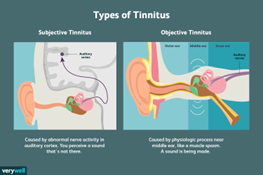A nurse is providing teaching for a client who has a prescription for gentamicin. Which of the following should the nurse include as an adverse effect of this medication?
Urinary frequency
Constipation
Hypertension
Tinnitus
The Correct Answer is D
The nurse should include tinnitus (ringing in the ears) as an adverse effect of gentamicin in the client's teaching. Gentamicin is an aminoglycoside antibiotic commonly used to treat bacterial infections. One of the potential side effects of gentamicin is damage to the inner ear, which can lead to tinnitus.
Tinnitus is a concerning symptom as it may indicate ototoxicity, which is damage to the structures of the inner ear responsible for hearing and balance. If the client experiences tinnitus while taking gentamicin, it is essential to notify the healthcare provider immediately to assess the severity of the issue and consider appropriate interventions.
Let's go through the other options and explain why they are not adverse effects of gentamicin:
A. Urinary frequency: Urinary frequency is not a common adverse effect of gentamicin. Gentamicin primarily affects the kidneys, and its main concern is related to potential nephrotoxicity (kidney damage) rather than causing urinary frequency.
B. Constipation: Constipation is not an adverse effect typically associated with gentamicin. Gentamicin is not known to affect the gastrointestinal system or cause constipation.
C. Hypertension: Hypertension (high blood pressure) is not a known adverse effect of gentamicin. Gentamicin primarily affects the kidneys and the inner ear, as mentioned earlier, but it does not significantly impact blood pressure.

Nursing Test Bank
Naxlex Comprehensive Predictor Exams
Related Questions
Correct Answer is D
Explanation
The client statement that indicates an understanding of the teaching is: "The medication can cause drowsiness."
Promethazine is an antihistamine medication commonly used to treat various conditions, such as allergies, motion sickness, and nausea. One of the most common side effects of promethazine is drowsiness or sedation. It has a significant sedative effect, and it is often used to induce sleep or manage insomnia in some cases.
Let's go through the other options:
A. "This medication can cause diarrhea": Diarrhea is not a common side effect of promethazine. While promethazine can cause certain gastrointestinal side effects like constipation or upset stomach, diarrhea is not typically associated with its use.
B. "The medication can cause increased salivation": Increased salivation is not a common side effect of promethazine. While some antihistamines can cause dry mouth, which is the opposite of increased salivation, promethazine does not usually cause excessive salivation.
C. "This medication can cause pupil constriction": Pupil constriction (miosis) is a potential side effect of some medications, but it is not commonly associated with promethazine. Promethazine is more likely to cause pupil dilation (mydriasis) rather than constriction.
Correct Answer is A
Explanation
A client with a magnesium level of 3.2 mEq/L has a higher-than-normal magnesium level, indicating hypermagnesemia. The nurse should expect to administer calcium gluconate.
Calcium gluconate is the antidote for hypermagnesemia, as it works to antagonize the effects of magnesium on the body. By administering calcium gluconate, the nurse can help counteract the effects of excess magnesium and normalize the client's magnesium levels.
Let's go through the other options:
B. Calcitonin: Calcitonin is not used to treat hypermagnesemia. Calcitonin is a hormone that regulates calcium and phosphorus levels in the body. It is used in certain conditions, such as hypercalcemia (high calcium levels), but it is not indicated for hypermagnesemia.
C. Magnesium oxide: Magnesium oxide is a form of magnesium supplement, and it is not appropriate for a client with hypermagnesemia, as it would further increase the magnesium level, exacerbating the condition.
D. Magnesium sulphate: Magnesium sulfate is also not appropriate for a client with hypermagnesemia, as it would further elevate the magnesium levels in the body. Magnesium sulfate is often used to treat magnesium deficiency or as a tocolytic agent to prevent premature labor.
Whether you are a student looking to ace your exams or a practicing nurse seeking to enhance your expertise , our nursing education contents will empower you with the confidence and competence to make a difference in the lives of patients and become a respected leader in the healthcare field.
Visit Naxlex, invest in your future and unlock endless possibilities with our unparalleled nursing education contents today
Report Wrong Answer on the Current Question
Do you disagree with the answer? If yes, what is your expected answer? Explain.
Kindly be descriptive with the issue you are facing.
